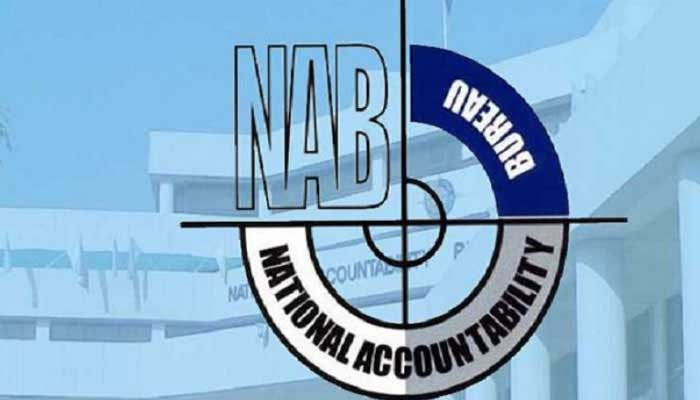NAB’s role to reduce by 60pc after new amendment
Misuse of authority will not be a punishable offence unless the public office holder accrues a material benefit in a manner that canbe proved
ISLAMABAD: The National Accountability Bureau’s (NAB) role will be reduced by more than 60 percent after its power has been clipped through the enforcement of amended version of National Accountability Ordinance as the Bureau has to first determine that a public office holder has assets beyond known means before implicating him in abuse of power case.
Misuse of authority will not be a punishable offence unless the public office holder accrues a material benefit in a manner that canbe proved. If NAB’s annual report of 2018 is taken a guide to examine the number of cases it investigated, around 60 percent were related to the misuse of authority whereas only six percent were about the accumulation of assets beyond known means. The Bureau has been investigating cases falling under six categories: illegal gratification, misappropriation/misuse of authority, accumulation of assets beyond known means, cheating with public at large, willful default cases and criminal breach of trust cases, according to the last year’s report.
As far as the matters pertaining to public office holders are concerned, they were first three in the above-mentioned list. Out of 78 cases under investigation in 2018, there was only one of illegal gratification, 45 of misappropriation/misuse of authority and five related to assets beyond known means. Case of cheating with public at large (matters related to housing societies, modaraba and other fraudulent schemes) are second highest after the misuse of authority which have been investigated.
From now on, NAB will have to lay more focus on assets beyond known means to implicate an accused in misuse of authority case. Earlier Article 9 (vi) of NAB Ordinance has declared this an offence. “If he misuses his authority so as to gain any benefit or favour for himself or any other person, or renders or attempts to render or willfully fails to exercise his authority to prevent the grant or rendition of any undue benefit or favour which he could have prevented by exercising his authority” was considered a corrupt practice.
However, a change in it made through amendment has inserted the following explanation: “For the purpose of this clause nothing shall be construed as misuse of authority by a holder of public office unless there is a corroborative evidence of accumulation of any monetary benefit or asset which is disproportionate to his known sources of income or which cannot be reasonably accounted for.” Without doing this, no private person who happens to be an alleged beneficiary of a misuse of authority can be investigated.
“The government has gone from one extreme to another,” commented Imran Shafiq, former prosecutor of NAB. Earlier, officials used to be implicated on flimsy charges and from now on misuse of authority has been granted a kind of blanket immunity, he said. They have virtually changed the definition of corruption in a way not even acceptable by international standards.
Already defined misuse of authority definition has been revised to explain that it is offence only when there is a proof that a material benefit has been accrued or some other person has been benefited, he explained. Not only assets beyond known means will have to be proved, their valuation is required to be done under prevalent DC rate which provides enough rooms to undervalue the assets.
Taking allegations against PTI government in different projects as example, the former prosecutor said it doesn’t matter how much loss has been incurred to the public exchequer due to BRT project, Malam Jabba case or Billions Tree Tsunami project, NAB will have to determine the beneficiaries of these projects before converting them into references.
-
 Rachel Reeves Predicts UK Economy Will Outperform Forecasts, But Experts Remain Cautious
Rachel Reeves Predicts UK Economy Will Outperform Forecasts, But Experts Remain Cautious -
 Hailey Bieber Reveals Doctors Warned Her Not To Get Pregnant: 'It Was A Surprise'
Hailey Bieber Reveals Doctors Warned Her Not To Get Pregnant: 'It Was A Surprise' -
 Jeff Bezos's Wife Lauren Sánchez Recalls Most 'special' Moment From Italy Wedding
Jeff Bezos's Wife Lauren Sánchez Recalls Most 'special' Moment From Italy Wedding -
 Selena Gomez Discusses The 'coolest' Milestone She Shares With BFF Taylor Swift
Selena Gomez Discusses The 'coolest' Milestone She Shares With BFF Taylor Swift -
 Priyanka Chopra Jonas Says Marrying Nick Felt Like 'third Or Fourth Lifetime'
Priyanka Chopra Jonas Says Marrying Nick Felt Like 'third Or Fourth Lifetime' -
 Catherine O'Hara Puts A Question Mark Over The Future Of 'Schitt's Creek' With Sudden Demise
Catherine O'Hara Puts A Question Mark Over The Future Of 'Schitt's Creek' With Sudden Demise -
 Sienna Miller Spills The Beans On Her Potential 'low Maintenance' Look Transformation
Sienna Miller Spills The Beans On Her Potential 'low Maintenance' Look Transformation -
 Future King William Already Calling The Shots?
Future King William Already Calling The Shots? -
 X Launches Standalone X Chat App In Limited IOS Beta
X Launches Standalone X Chat App In Limited IOS Beta -
 Inside Keith Urban's Make-or-break Plan To Reunite With His Daughters
Inside Keith Urban's Make-or-break Plan To Reunite With His Daughters -
 Apple Unveils Latest MacBook Pro Models With Game-changing Features, Huge Storage Capacity
Apple Unveils Latest MacBook Pro Models With Game-changing Features, Huge Storage Capacity -
 Emma Watson Spoke Candidly About The Jarring Impact Of Fame On Personal Relationship Building
Emma Watson Spoke Candidly About The Jarring Impact Of Fame On Personal Relationship Building -
 Here’s How AI Translates Brain Signals Into Words
Here’s How AI Translates Brain Signals Into Words -
 Andrew Surrenders Another Crown Estate Property After Epstein Files Shame
Andrew Surrenders Another Crown Estate Property After Epstein Files Shame -
 Harry Styles Reveals Why He Loves Running
Harry Styles Reveals Why He Loves Running -
 'Harry Potter' Star Eyes Comeback To The HBO Reboot Show
'Harry Potter' Star Eyes Comeback To The HBO Reboot Show




